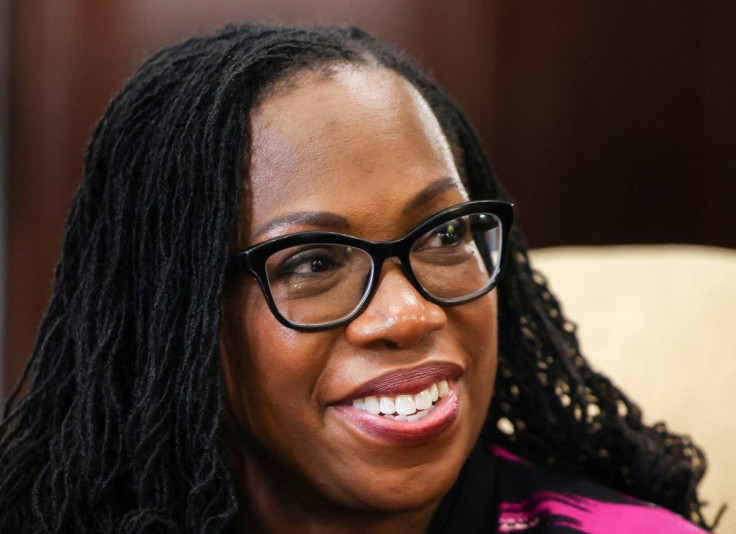Senate Democrats Defend Historic U.S. Supreme Court Pick Jackson

Senate Judiciary Committee Democrats on Monday defended President Joe Biden's U.S. Supreme Court nominee Ketanji Brown Jackson from Republican criticism as the panel opened her confirmation hearing to become the first Black woman to join the nation's top judicial body.
Committee members delivered opening statements, with Democrats hailing the historic nature of her selection and praising her record as a federal appellate and district court judge, while Republicans attacked some of her past rulings and tried to link her to advocacy groups on the left.
Biden last month nominated Jackson, 51, for a lifetime job on America's top judicial body to succeed retiring liberal Justice Stephen Breyer, setting up a confirmation battle in the closely divided Senate.
If confirmed, she would be the 116th justice to serve on the high court.
"Not a single justice has been a Black woman. You, Judge Jackson, can be the first," Senator Dick Durbin, the Democratic chairman of the committee, said in his opening statement.
"It's not easy being the first. You have to be the best and in some ways the brightest. Your presence here today and your willingness to brave this process will give inspiration to millions of women who see themselves in you," Durbin added.
Durbin defended Jackson, saying attacks on her by some conservatives as "soft on crime" are baseless and unfair and said her judicial record showed that she would not be a "rubber stamp" for Biden. Durbin noted that law enforcement organizations including the Fraternal Order of Police have endorsed Jackson's nomination.
Jackson entered the packed hearing room before the session began and was greeted by some of the committee members and well-wishers as she took her place alone at the witness table.
"We will conduct a thorough, exhaustive examination of Judge Jackson's record and views," said the committee's top Republican, Senator Chuck Grassley.
Grassley said Republicans "won't try to turn this into a spectacle" and will treat Jackson with respect but will "ask tough questions about Judge's Jackson's judicial philosophy."
Grassley signaled that Republicans would probe Jackson's two-year stint earlier in her career as a lawyer defending low-income criminal defendants, saying it was fair game to probe "criminal defense lawyers who disagree with our criminal laws and want to undermine laws that they have policy disagreements with."
Republican Senator Lindsey Graham questioned why outside groups pushing for left-leaning judges had backed Jackson's nomination.
Graham, one of three Republicans who voted to confirm Jackson to her current position as an appeals court judge, signaled that his vote was not certain, in part because liberal groups opposed his favored nominee, Michelle Childs, a federal district judge based in his home state of South Carolina.
"This is a new game for the Supreme Court, and this game is particularly disturbing to me because there's been an effort on the left to take down a nominee from my state," Graham said.
Graham said that Republican court nominees have been asked tough questions by Democrats in prior confirmation hearings about their judicial philosophy but Republicans would be called racists if they do the same.
"The bottom line here ... it's about 'we're all racists if we ask hard questions.' That's not gonna fly with us. We're used to it by now," Graham said.
Jackson later on Monday is set to make an opening statement. Biden's fellow Democrats narrowly control the Senate, which has the authority under the U.S. Constitution to confirm a president's judicial appointments.
The Senate previously has confirmed Jackson to three federal posts, most recently last year, when Biden nominated her to the U.S. Court of Appeals for the District of Columbia Circuit after eight years as a federal district judge in Washington.
IDEOLOGICAL BALANCE
Her confirmation would not change the ideological balance of the Supreme Court, which has a 6-3 conservative majority, including three justices appointed by Biden's Republican predecessor Donald Trump. But it would let Biden freshen the court's liberal bloc with a justice young enough to serve for decades. Breyer, 83, is the court's oldest member.
Jackson was raised in Miami and attended Harvard Law School, later serving as a Supreme Court clerk for Breyer and representing criminal defendants who could not afford a lawyer.
Her nomination fulfilled Biden's 2020 campaign promise to name a Black woman to the court, a milestone he called long overdue. If confirmed, she would be the third Black justice, following Clarence Thomas, appointed in 1991 and still serving, and Thurgood Marshall, who retired in 1991 and died in 1993.
"With your presence here today, you are writing a new page in the American history book," Democratic Senator Patrick Leahy said.
The Supreme Court said on Sunday that Thomas was hospitalized in Washington on Friday with an infection.
Jackson also would become the sixth woman to serve on the Supreme Court, which currently has three female justices.
The Senate is divided 50-50 between the two parties, with Biden's fellow Democrats controlling it because Vice President Kamala Harris can cast a tie-breaking vote. A simple majority vote would be needed for Jackson's confirmation, meaning she would get the job if all Democrats are united behind the nomination regardless of what Republicans do.
The confirmation hearing ends on Thursday with witnesses testifying about Jackson's suitability for the job. The Judiciary Committee would then vote on the nomination in the coming weeks, followed by a final confirmation vote on the Senate floor.
© Copyright Thomson Reuters 2024. All rights reserved.





















